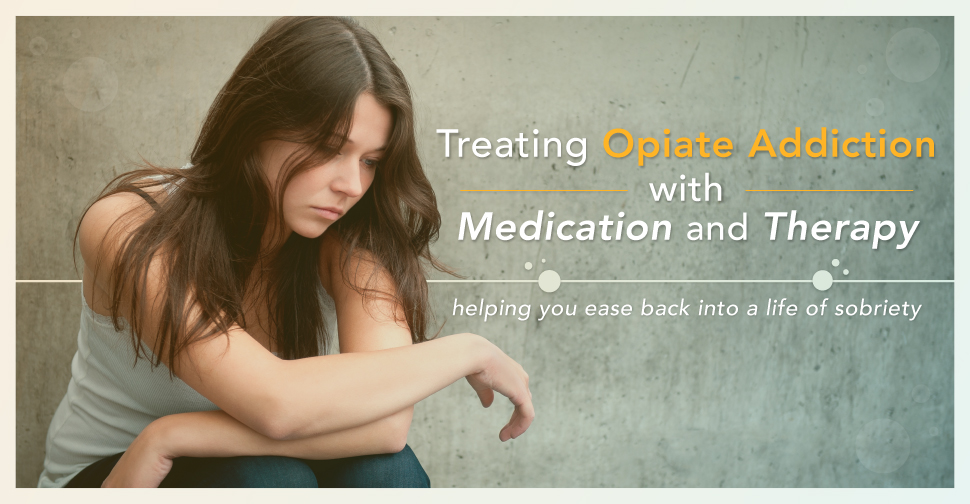
Opiate addiction is a damaging disease that can derail your life and make your dreams feel out of reach. However, the world of rehabilitation has created a whole range of treatments that can soothe your body and mind. Medications and therapy are designed to help ease you back into permanent sobriety.
Medicines Used For Opiate Addiction
The major reason that many people struggle to beat opiate addiction is the withdrawal symptoms. Withdrawal will cause a variety of physical and mental problems and can even be deadly. This is where medicine therapy comes into play. Medicines are designed to help lower the severity of these withdrawal symptoms and make it easier and safer to quit.
These medicines work by activating the opioid receptors in the mind in a safer and less harmful way than hardcore opiates. Some of these medicines include:
- Methadone
- Naltrexone
- Buprenorphine (Subutex or Suboxone)
Each of these drugs work in a slightly different way. For example, buprenorphine is actually an opioid agonist, which means it reduces cravings but doesn’t create a sensation of “feeling high.” Naltrexone behaves in a similar way, but is not addicting. The oldest of these drugs– methadone –simulates an opiate high and is addicting, but on a much lower level than illicit opiates (heroin, opium, morphine etc).
The Replacement Therapy Method
When you are prescribed a medication for opiate addiction, you are undergoing what is known as “replacement therapy.” Essentially, the medications simulate the effect of opiates on your system in order to safely and effectively manage your withdrawal symptoms. Over a period of time, the level of replacement medicines in will be decreased until withdrawal is over.
But how long does that take? There are a few different models of replacement therapy. These models vary based on the speed at which the opiates are removed. Some of these models include:
- Quick decrease
- Slow release
- Graduation release
Each therapy has its own benefits and drawbacks. For example, quick release is often preferable for people with light opiate addictions, because it helps them get over their addiction at a much faster pace. However, slow release gives people with severe addictions more time to recover.
Graduation is different: it follows a pattern of quick and slow release that is designed to help your body get over opiate addiction quicker than slow release, but without the potentially fast-acting and painful withdrawal that comes with quick release.
Therapies Utilized For Addiction
Beyond medication, you’ll also be able to receive various forms of psychological and behavioral therapies. These therapies are designed to diagnose underlying problems that may contribute to your addiction and help you break any problematic behaviors that may further fuel your addiction.
Typical therapies include:
- Psychotherapy – helps identify mental and emotional concerns (such as bipolar disorder)
- Personal Counseling – discusses problems and anxieties that further influence addictions
- Family Therapy – brings loved ones (including friends) into your circle of counseling as a support system
- Group Therapy – connects you with other people who are struggling from opiate addiction and helps you work through cravings and relapse concerns together
- Cognitive-Behavior Therapy – identifies behaviors that cause addiction and creates coping mechanisms
- Dialectical Behavioral Therapy – designed for people with borderline personality disorder who also suffer from drug addiction
Choosing one of these therapies requires carefully assessing your individual addiction and what type of therapy would work best for you. People who work best in a one-on-one situation usually excel in individual therapy, while others may require the social support of a family. Those who suffer from behavioral problems should receive at least one form of behavioral therapy to beat opiate addiction.
Combining These Approaches
A successful treatment for opiate addiction combines aspects of both medicine and psychological therapy methods to create a holistic recovery. Medicines help treat the physical aspect of the addiction and usually come first. Detoxification is a necessary first step because trying to honestly tackle your psychological concerns will be nearly impossible when you’re high.
Replacement medicines will help keep your physical health stable and give you the strength you need to tackle difficult emotional problems and implement new coping strategies. Slowly, but surely, your physical need for opiates will disappear and the emotional problems that drive you to addiction will be understood more fully.
Other aspects of a typical treatment include:
- Physical exercise
- Professional Interventions
- Making amends with friends and family members
- Employment placement
- Dietary and nutritional advice
Take A Chance On Recovery
 The opiate addiction treatment process is one that is designed to get you off of opiates and back on your feet. For more information about this process, please contact us at DrugRehab.org. We can help you find the right center for your needs and even help sort out your insurance information.
The opiate addiction treatment process is one that is designed to get you off of opiates and back on your feet. For more information about this process, please contact us at DrugRehab.org. We can help you find the right center for your needs and even help sort out your insurance information.
